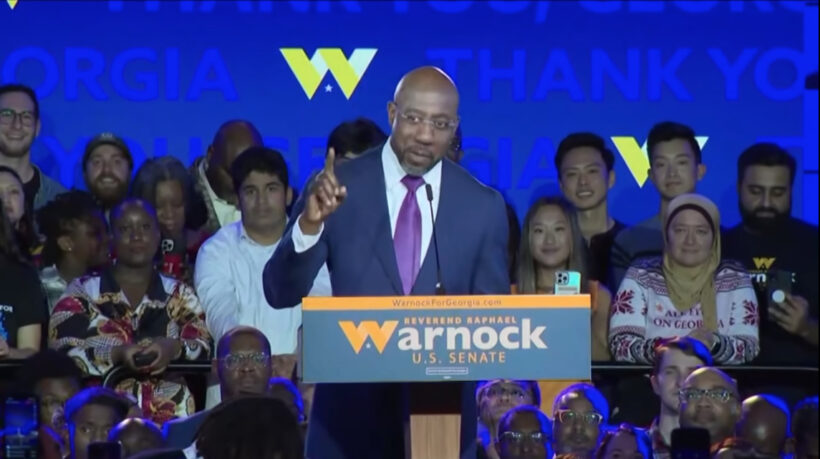“It is an honour for me to utter the four most powerful words ever spoken in a democracy: the people have spoken.” With these words addressed to his supporters, Senator Rafael Warnock on Tuesday night celebrated his victory in the run-off election to renew his seat in the US Senate representing the state of Georgia. Warnock ran against Republican Herschel Walker, a former football star. Walker, a hand-picked candidate of former President Donald Trump, proved to be a flawed contender. However, Warnock’s campaign had to overcome a complex series of laws and strategies aimed at reducing voter turnout that were implemented by Georgia Republicans.
In his victory speech, Warnock went on to say: “There are those who will look at the outcome of this race and say there is no limitation on voter turnout in Georgia. Let me be clear, just because people stood in long lines, some even several blocks long, just because people endured the rain and the cold and overcame all kinds of obstacles to vote, that does not mean that those obstacles to voting rights do not exist. It simply means that you, the people, have decided that your voices will not be silenced”.
In 2020, control of the US Senate passed to the Democrats following Donald Trump’s defeat in the presidential election and the unprecedented victory of Reverend Raphael Warnock and Jon Ossoff in the Georgia state elections two months afterwards, making them the first African-American and first Jewish senator, respectively, in the state’s history. In response, the Republican-controlled Georgia state legislature quickly passed SB202, the so-called ‘Election Integrity Act of 2021’. This law restricted the time between the general election and the run-off election, made it more difficult to obtain a vote-by-mail ballot, and even made it a crime to hand out water to voters who stand in line for hours at the polls to cast their ballots.
Voter turnout on 6 December in Georgia’s legislative run-off election was historic. Republicans tried to restrict early voting as much as possible; they even tried to remove the Saturday after Thanksgiving from the early voting scheme. The justification given for eliminating the ability to vote on that key day was that it was the day after “State Holiday Observance 1,” the new term used for what was, until 2015, a Georgia holiday commemorating Confederate General Robert E. Lee’s birthday. Warnock’s campaign team sued over it, and the state Supreme Court struck down Georgia’s new rules. LaTosha Brown, co-founder of the organisation Black Voters Matter, told Democracy Now! this week: “That weekend ended up being one of the highest voter turnout weekends in history.
That the courts have a say in how Georgia manages its elections seems perfectly reasonable. But the ability of courts or governors to weigh in on election laws passed by state legislatures is at risk. On Wednesday, the US Supreme Court heard oral arguments in “Moore v. Harper,” a case in which the Republican-controlled North Carolina state legislature argues that neither state courts nor the governor can second-guess any election legislation passed by the legislature, including redistricting. The case was filed after the state Supreme Court struck down congressional redistricting, which had been heavily gerrymandered by North Carolina Republicans after the 2020 presidential election.
If the so-called “independent state legislature theory” is upheld by the US Supreme Court, it would represent a sea change in US electoral law and one of the most serious threats to democracy in modern US history.
Efforts to restrict voting rights are widespread across the United States. The Brennan Center for Justice is tracking at least 405 bills restricting voter participation and 151 election interference bills, all introduced at the state level in 2022. If the Supreme Court decides in favour of the independent state legislature theory, such legislation cannot be vetoed by governors or reviewed by state courts.
Speaking to Democracy Now!, Cliff Albright, co-founder and executive director of the Georgia chapter of Black Voters Matter, said of the case, “If these state legislatures can act dishonestly without accountability, the concept of democracy in this country could be dealt a final blow.
These laws aimed at restricting voting rights are just the latest front in the war on democracy. For a long time after the Civil War and Reconstruction period, acts of violence and terrorism by white supremacists, lynchings, and Jim Crow-era segregationist laws – such as poll taxes and literacy tests – were used to disenfranchise voters of colour.
Raphael Warnock’s victory marks the first time an African-American Democrat has been elected to a full six-year term in the US Senate representing a state that was part of the former Confederacy.
In his victory speech on Tuesday, Warnock said: “I am a proud son of Savannah, Georgia, a coastal city known for its green squares and cobblestone streets and tall, stately oaks draped in Spanish moss. My roots, like the roots of those oak trees, run deep into the soil of Savannah’s cities […]. I am Georgia. I am an example and an iteration of its history, its pain, its promise, its brutalities and possibilities”.
The task before any American who supports the principle of democracy is to strengthen grassroots activism, to expand the possibilities and eliminate the brutalities of which Senator Warnock speaks.










